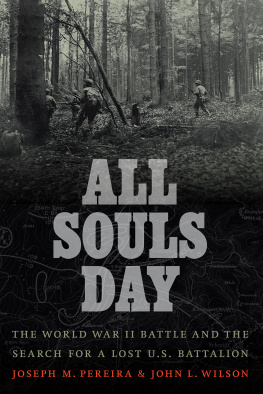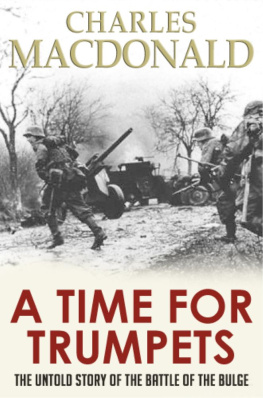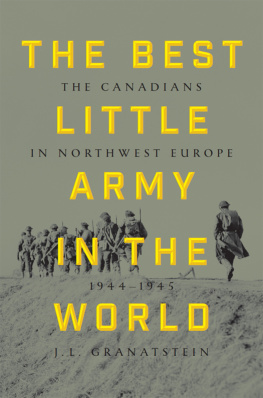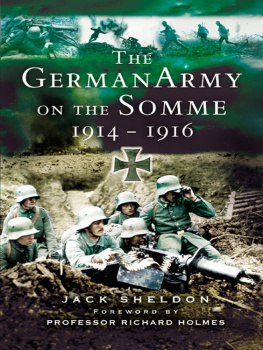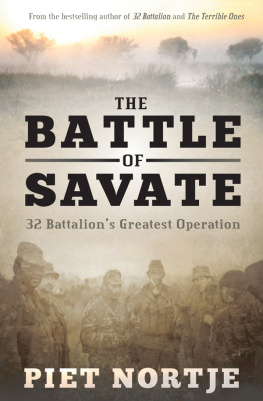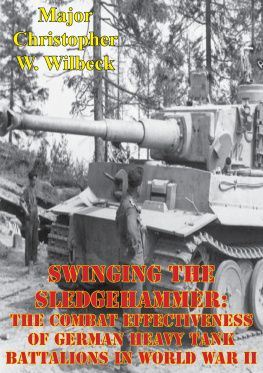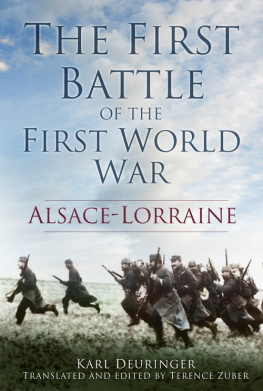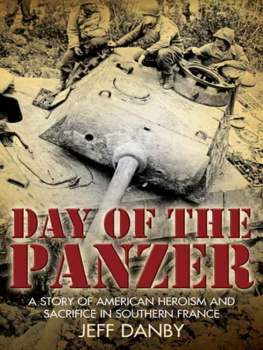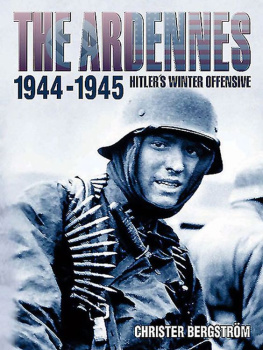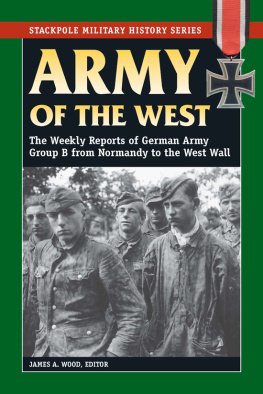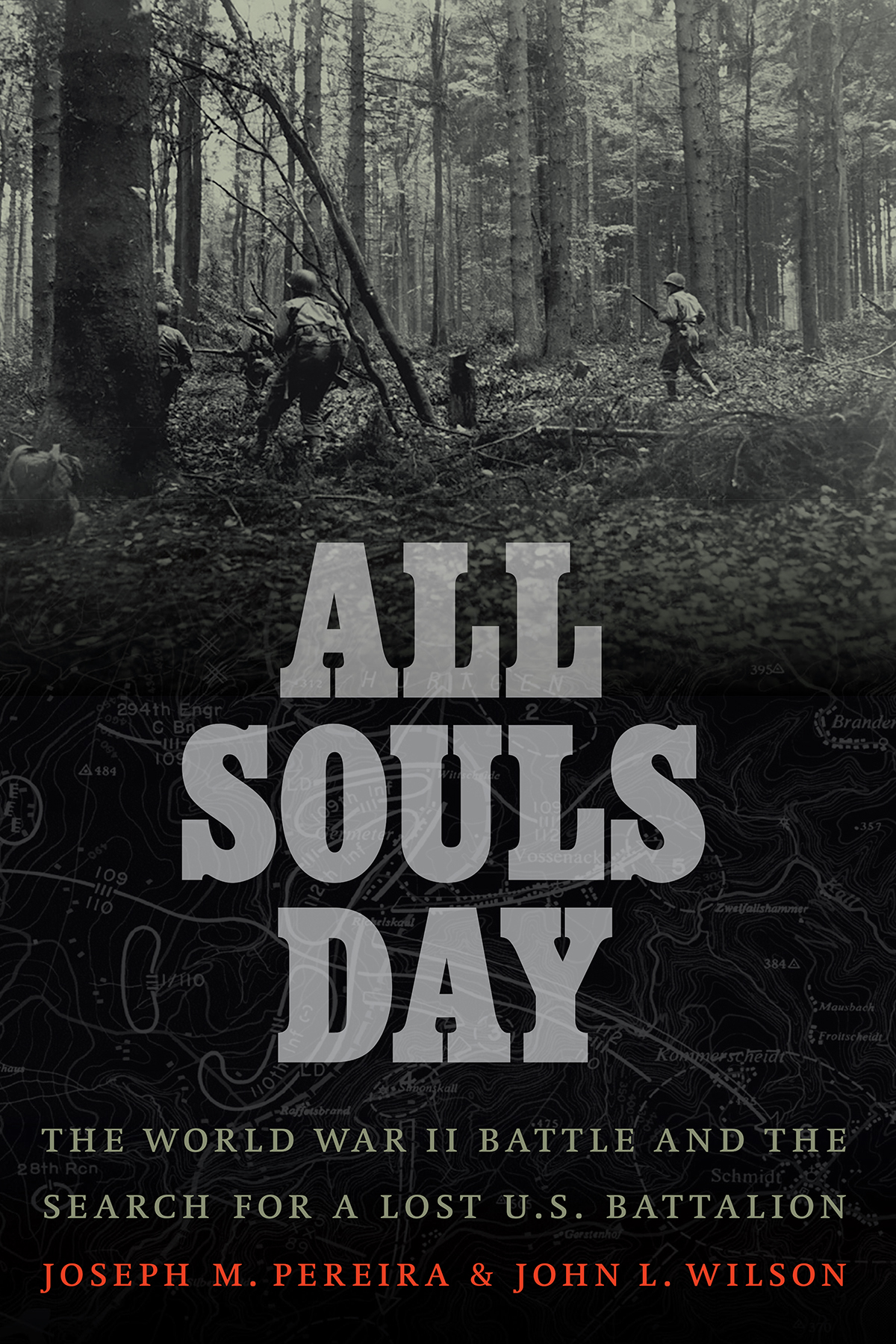
No family, no community, and no nation rests fully until its sons and daughters in arms have come home. In that spirit, we should all honor and encourage the work expressed in this book.
Deval Patrick, former governor of Massachusetts
You might think that by now every story about World War II has been told. Think again. This book, based on in-depth investigative reporting, tells a compelling story that youve never heard about. Its a story that has needed to be told and is one youll want to read.
Joe Bergantino, cofounder of the New England Center for Investigative Reporting
An impressive historical investigation into the battle on All Souls Day and into the men and the mystery of the lost battalion.... It is a remarkable and impressive effort to apply investigative journalism skills to bring to life a battle buried in the annals of World War II.
Brett Arends, author and columnist for Dow Jones publications
Historians usually dissect an event and then analyze its impact over time. In All Souls Day the authors do the opposite. They start with the loss felt by American families of soldiers killed under mysterious circumstances during World War II and then work their way back in time to uncover what really happened and give those families some closure. Its an investigative masterpiece that exposes the horror of war on so many levels.
Bruce Mohl, editor of Commonwealth Magazine: Nonprofit Journal of Politics, Ideas, and Civic Life
All Souls Day
The World War II Battle and the Search for a Lost U.S. Battalion
Joseph M. Pereira and John L. Wilson
Potomac Books
An imprint of the University of Nebraska Press
2020 by Joseph M. Pereira and John L. Wilson
Cover designed by University of Nebraska Press; cover image: Library of Congress Prints and Photographs Division, Washington DC , LC-DIG -ppmsca-19022.
All rights reserved. Potomac Books is an imprint of the University of Nebraska Press.
Library of Congress Cataloging-in-Publication Data
Names: Pereira, Joseph M., author. | Wilson, John L. (Military historian), author.
Title: All Souls Day: the World War II battle and the search for a lost U.S. battalion / Joseph M. Pereira and John L. Wilson.
Other titles: World War II battle and the search for a lost U.S. battalion
Description: Lincoln NE : Potomac Books, an imprint of University of Nebraska Press, [2020] | Includes bibliographical references and index.
Identifiers: LCCN 2020010711
ISBN 9781640122253 (hardback)
ISBN 9781640124202 (epub)
ISBN 9781640124219 (mobi)
ISBN 9781640124226 (pdf)
Subjects: LCSH : United States. Army. Infantry Regiment, 112thBiography. | Hrtgen Forest, Battle of, Germany, 1944. | United States. Army. Infantry Regiment, 112thHistory. | United States. Army. Infantry Division, 28thHistory. | SoldiersUnited StatesBiography. | World War, 19391945Missing in actionUnited States. | Missing in actionFamily relationshipsUnited States. | World War, 19391945Repatriation of war deadUnited States. | United States Army. Infantry Regiment, 112thRegisters. | World War, 19391945Regimental historiesUnited States.
Classification: LCC D 769.31 112th P 47 2020 | DDC 940.54/213551dc23
LC record available at https://lccn.loc.gov/2020010711
The publisher does not have any control over and does not assume any responsibility for author or third-party websites or their content.
In Flanders fields the poppies blow
Between the crosses, row on row
That mark our place; and in the sky
The larks, still bravely singing, fly
Scarce heard amid the guns below
We are the Dead. Short days ago
We lived, felt dawn, saw sunset glow,
Loved, and were loved, and now we lie
In Flanders fields
Take up our quarrel with the foe:
To you from failing hands we throw
The torch; be yours to hold it high
If ye break faith with us who die
We shall not sleep, though poppies grow
In Flanders fields
Lt. Col. John McCrae MD , Canadian Army, Ypres, Belgium, May 1915
Contents
Photographs
Tables
There is an irony to the tale of All Souls Day, and it took me a while to see it. On its face its a book about war, but its stories are really about lovea type that I was unfamiliar with, and perhaps thats why at first I didnt get it. This is a love that has no bounds. It drives people to cross oceans, travel great distances, spare little expense, write letters for decades on end, and endure an eternity of pain.
Jack, the coauthor of this book, of course, has lived that life, and I thank him for sharing it with me. How can you love someoneI mean truly love someoneyouve either never seen or, if you did, for only a brief time? I subsequently came to learn of so many others like Jack, some of whom made it into this book and some who didnt: Rosemary Farrell in Norwood, Massachusetts; Peggy Robinette in San Francisco, California; Eve Cunningham in Roswell, Georgia; Stanley Farrior in Burgaw, North Carolina; Linda Bepler in Sarasota, Florida; Nancy Eckel in Marlboro, New Jersey; Amelia Messina in Mays Landing, New Jersey; Charles Pecue in Hudson Falls, New York; Sheila Peterson Helmberger in Baxter, Minnesota; Leonard Greenway in Rolling Hills Estates, California; Judith Sullivan Crittenden in Birmingham, Alabama; Willie Fikes and Ed Howell, both in Hamilton, Alabama; Jean Sanders Mixon in Hawkinsville, Georgia; Ken Harbison in Xenia, Ohio; and Rebecca Detmer in South Norfolk, Virginia. Their numbers are many, and they walk among us, bearing this yoke upon them.
Im also indebted to many others who have contributed, each in their own capacity, to the telling of this story: Sally Hughes, for mustering the energy to pore over every word in the manuscript and reminding memore often than I sometimes appreciatedof their misplacement or misuse; Dylan Hughes, a computer whisperer, for creating a software application to help me catalog in tidy tables the sacred names, ranks, and serial numbers of the missing; Carole-Anne Tyler, a published author and university professor, for her lengthy late-night emails (after hours of correcting graduate dissertations) about academic press rigor; Rachel Luebke, a millennial fresh out of graduate school, for declaring what would (or wouldnt) resonate with a generation for whom the war is primarily a couple of chapters in a history book or the subject of a Netflix documentary; Anthony Grasso, a nonagenarian prodigy who remembers the questions on his high school exams from 1943, for tolerating such questions from me as What did you have for supper the night before you left for the war? (spaghetti and meatballs); Bette Miller, for showing me the vestiges of a town from the 1940s that linger in the pretty homes, yards, and roads that is the Spirit Lake, Iowa, of today; military historian Thomas Bradbeer, who, despite teaching full time, writing a book, and taking numerous government-business trips to Florida and the UK, made time for three long sessions to explain the U.S.Armys deployment in the Hrtgen Forest; curator Charles Oellig, for permitting me to enter his private study in a loft above the Pennsylvania National Guard Museum so that I could thumb through his neatly arranged stacks of unpublished manuscripts and obscure writings by soldiers who fought in the All Souls Day battle; Bill Snider, the grandson of the regimental commander of the 112th, who, without any coaxing, provided a trove of documents from his familys collection; Cindy Davis, director of Spirit Lake Public Library, who made available its carefully archived literature on the regions early beginnings and town history; Ed and Anita Tiebax, who, from their home fifty miles away from the Hrtgen Forest, in Maasbracht, Netherlands, have collected every scrap of information that has been recorded about four of the soldiers in this book; and five other Europeans, all German nationalsLudwig Fischer in Schmidt; Achim Konejung in Muddesheim-Vettweiss; Pr. Axel Lautenschlager in Vossenack; Dr. Christoph Rass in Ossnabruck; and Manfred Jansen in Aachenfor their touching generosity with their time, writings, and research materials. Also, of invaluable help was the devoted staff at the National Archives and Records Administration, which helped locate aging files among two billion feet of documents in its glass-encased edifice at College Park, Maryland; Bobby O. Bell of Hombourg, Belgium; Paul Fowler and Jamie Harmon of Salem, New Hampshire; Deborah Hawkins of Pawlet, Vermont; Dr. Arne Esser in Germany; and Bill McCarthy of Arlington, Massachusetts.
Next page
